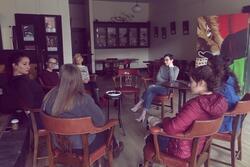The Internet’s Girlfriend and the Power of the Business Card
As a teenage girl, I’m always typecast as the “girlfriend of the internet.” People assume that scrolling through Instagram is my workout routine, selfies are my art form, and Netflix shows are the extent of my worldly exploration. Although these stereotypes may only apply to the generations of women who’ve grown up in the digital age, these kinds of assumptions are far from contemporary. Constricting suppositions about young women are nothing new. We’re “bored by academia,” “weak,” “hysterical,” “hormonal,” “boy crazy,” and “fashion-obsessed.” Of course, we teenage girls are sometimes hormonal, fashion-obsessed, and a little romance-crazy (as most teenagers are), but we are so much more than that.
Before we get any further, let me just say: Hi, I’m a sixteen-year-old girl, and I’m a complex, thinking, doing, creating, human being. I’m asking people to look past the fuzzy pink coat of assumptions most will place on me after their first glance my way. When I put myself out into the world, I must first overcome a myriad of assumptions about teenage girls before I get the chance to be seen as anything else.
First impressions aren’t easy for anyone, but with the added layer of being confined to the fragile pink silhouette of a screen-addicted, airhead teenage girl, I’ve found that tools for overcoming these false impressions are a necessity.
A few months ago, I printed my first business cards. I ordered a set of two-hundred grey, rectangular cards with my photo, name, email, phone number, and a few words that describe who I am and what I do: “writer, poet, speaker, activist.” But it’s not what’s on the card that matters, it’s the card itself. I’ve found that this 3.5 by 2 inch piece of paper is enough to slice through the prescribed “internet’s girlfriend” image.
I ran into an old Hebrew School teacher in a cafe recently. Unsurprisingly, she didn’t recognize me (I’ve certainly changed a bit since the second grade), but I jogged her memory about our Sunday morning sing-alongs and she seemed to at least vaguely recall my existence. She since began working as a Rabbi at a different congregation. I asked about the youth education programming at her new synagogue and expressed interest in engaging with her community as an Israel educator. She nodded along, listening to my elevator pitch, but it wasn’t until I pulled a business card out of my back pocket and handed it to her that I saw it register in her mind: “This girl is for real.”
I couldn’t tell you what happened to that card after our interaction, and to be honest, it’s likely crumpled at the bottom of her backpack; but nonetheless, it did its job. By handing her a tangible symbol of my professional intentions, I believe I broke through some of the assumptions that she may have made about me, and got her to see me as a professional.
My business card is something to being taken seriously, but even as it sits in my wallet, this card serves as a mini vision board. When I designed these cards, I was forced to create a picture-perfect paper placard of my professional self to present to the outside world. What I finally decided on, however, is now the guiding image of my best self that I refer back to whenever I feel lost or am lacking motivation.
The image of myself I chose to print on the card was taken from the slam poetry stage— my happy place. I don’t have an official profession yet so I printed my passions onto the card, “speaker, writer, poet, activist.”
In case you didn’t notice, I will point out that none of these passions have anything to do with the internet… but I will also confess that printed just below this list of unofficial professions is my Instagram handle.
I mentioned earlier the stereotype of the screen-addicted, airhead teenage girl, and I hope that since then I’ve proven that label is irrelevant. However, I would like to return to the “screen” aspect of it. The internet is not just a pastime. It’s a fearsome tool for activism, community organizing, expression, literature, and networking. The girls in my generation have taken ahold of all the opportunities that the internet provides to further our passions. The voices of teenage girls have never before had such an incredible platform, and thus the rest of the world is afraid of our potential power. The stereotypes placed on us have been created to dismiss both us and our time spent on the internet. By adding my Instagram handle to my physical business card, I am bridging the gap between my in-person professional presence and my presence on the internet, in hopes of breaking through a firewall of stereotypes.
I know that teenage girls aren’t the only ones who fall prey to silencing stereotypes; this is something that most people experience in one way or another, or at one time or another. My business cards are instrumental in helping me to overcome these assumptions. They’re my secret weapon.
As a society, we must address the purposes and origins of stereotypes. As individuals, we must realize that stereotypes aren’t going away anytime soon and we must all find secret weapons to combat them.
This piece was written as part of JWA’s Rising Voices Fellowship.








Ruby what a well written and thought provoking piece you have done. As always you continue to make your presence known in a most exciting manner. I am so thrilled with you and your platform. Keep up the amazing work. You are a shining star.
queen